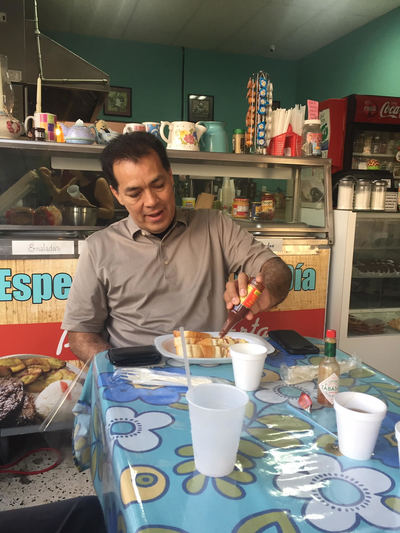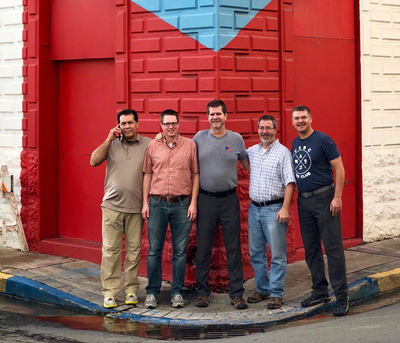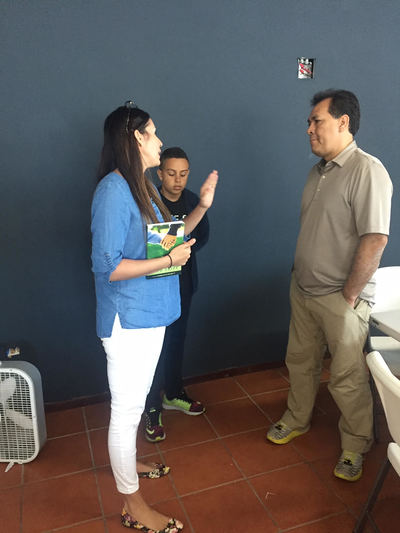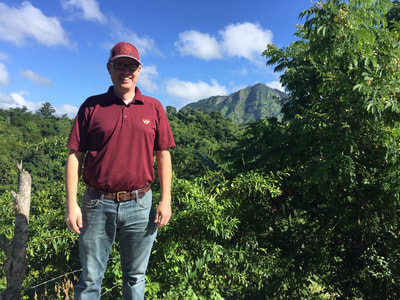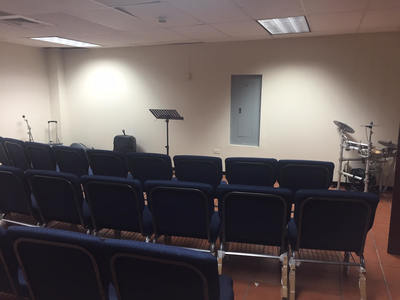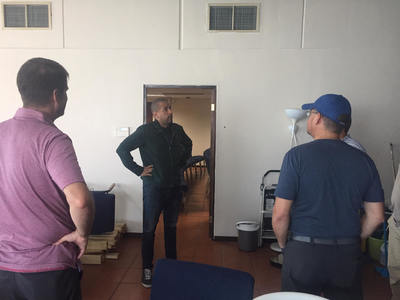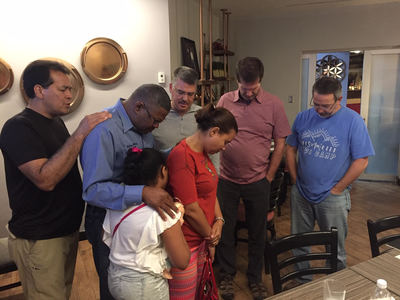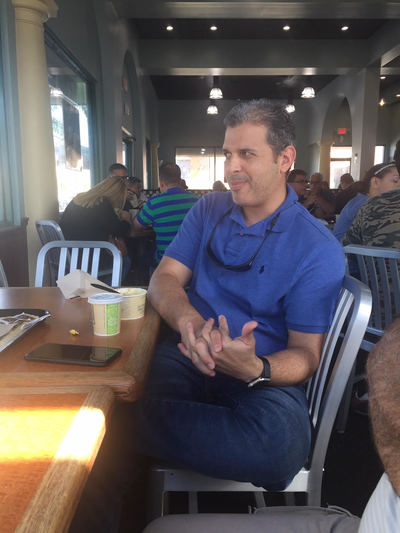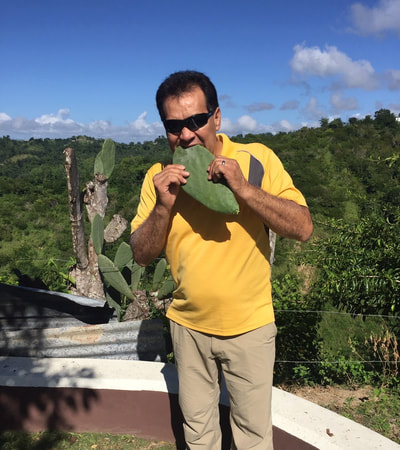Reflections on The Puerto Rico Vision Trip
"After spending four days on a vision tour in Puerto Rico alongside of Pastor Job and three pastors from Cave Spring Baptist, I woke up this morning with some reflections rapidly running through my mind. I have tried to capture most of them here.
1. When you go somewhere prayerfully asking God to open your eyes to His work and how He wants you to be involved, He will answer. We did not go to Puerto Rico with pre-determined answers, but it is fair to say we were leaning in a direction, and now God seems to be clearly leading us in a different direction.
2. Getting out of your context gives you fresh eyes on your context. Both Job and I found ourselves making observations about the Roanoke Valley and church life in the Roanoke Valley that had not really occurred to us (at least as profoundly) when we were sitting right here in the Roanoke Valley.
3. As an example of observation #2: there is much that we do every week that is beneficial but not essential to church life. We do not have to have, for example: bulletins, padded chairs, pipes big enough to flush toilet tissue (that’s right!...TP goes in a wastebasket in PR), offering plates, air conditioners, instruments, amplifiers, good signage, PowerPoint, good graphic design, and a host of other very good things to be Christ’s church. Many of these good things can get in the way of the best things — reading the Word, hearing the Word, praying, singing the gospel and its implications to God and one another, confessing our sins to one another, sharing the gospel, developing leaders, opening our homes to one another, and etc. — if we allow them.
4. What we saw in the pastors planting churches in hurricane-ravaged Puerto Rico were men focused on getting the essentials right — putting in place a system to train leaders to train leaders and turn the church into a disciple-making engine fueled by the Holy Spirit and obedience to God's Word. This does not mean they do not also pay attention to beneficial things. For example, their church plants have more modern-looking/functioning websites than we do. However, the website is simply a door into a community where people find life in Christ through the ministry and hospitality of His body doing the essentials that Christ commanded. What is beneficial supports the essential. Churches stall when the essential serves the beneficial.
5. Christians cannot afford to become complacent or dwell on the past when they are planting a church because the church will die before things become sustainable. In church plants, there is a fresh vitality, flexibility, entrepreneurial spirit, and urgency to train new pastors and lay-leaders that should really characterize every church. We seldom become more like Christ or participate in advancing the Kingdom through what is comfortable or routine. This is not, of course, an argument for doing away with the routines the Bible has given to the church. It may mean, however, exploring new ways to do those routines and make them more effective. For example, what if Christian hospitality and Bible study were paired together rather than always meeting at a central building? When planting a new church, this approach has proven very effective (and Biblical!...”house-to-house") in helping the church engage lost neighbors and friends. It is very difficult to make disciples if we are not reaching lost people who need to be converted, baptized, and taught!
6. The Spirit makes men fearless when they know they are heeding God’s call and walking in obedience. We visited one man, age 32, planting a church about 30 minutes outside of the capital city of San Juan. His family has been through all sorts of turmoil this year - sickness, death, surgeries, mysterious infection and hospitalization, broken-down cars, and a school closing bringing even more changes into his young daughter’s life. This young man may become a planter we work with in Puerto Rico. When I asked him what he’s afraid of, he said, “The only thing I fear is that He would not find me faithful. I want to give Him my all.” In other words, he fears God and God alone. He is doing everything He can to share Christ and the gospel with his beloved Puerto Ricans. How exciting to know we are already part of helping him each week through the Cooperative Program! How much more exciting that we may be able to help him (or someone like him...we met another man in a very similar situation in a city near San Juan) to reach Puerto Rico for Jesus.
7. There are many people who use religious language who are far from God. Many Puerto Ricans say “God bless you,” but relatively few have the eternal life the Apostle John speaks of when he writes, “And this is eternal life, that they know you, the only true God, and Jesus Christ whom you have sent” (John 17:3). This, of course, is still true in much of the Southeastern US. Whether it is in the US territory of Puerto Rico or in our hometown, we must not forget that many who say the right words are still heading the wrong direction. If we love them, we must reclaim an urgency for sharing the gospel with them and being a church that is believing and living out the things assigned to us in the Scriptures.
8. Pastor Job can put away some food and saw some logs!
On a more serious concluding note, thank you for praying for us. I believe Christ is paving a way to join His work in Puerto Rico, and I look forward to seeing how God uses us there to reach a city and eventually impact an island for the glory of Christ our King.
-Brother Daniel
10.26.18
#reachtheworld
1. When you go somewhere prayerfully asking God to open your eyes to His work and how He wants you to be involved, He will answer. We did not go to Puerto Rico with pre-determined answers, but it is fair to say we were leaning in a direction, and now God seems to be clearly leading us in a different direction.
2. Getting out of your context gives you fresh eyes on your context. Both Job and I found ourselves making observations about the Roanoke Valley and church life in the Roanoke Valley that had not really occurred to us (at least as profoundly) when we were sitting right here in the Roanoke Valley.
3. As an example of observation #2: there is much that we do every week that is beneficial but not essential to church life. We do not have to have, for example: bulletins, padded chairs, pipes big enough to flush toilet tissue (that’s right!...TP goes in a wastebasket in PR), offering plates, air conditioners, instruments, amplifiers, good signage, PowerPoint, good graphic design, and a host of other very good things to be Christ’s church. Many of these good things can get in the way of the best things — reading the Word, hearing the Word, praying, singing the gospel and its implications to God and one another, confessing our sins to one another, sharing the gospel, developing leaders, opening our homes to one another, and etc. — if we allow them.
4. What we saw in the pastors planting churches in hurricane-ravaged Puerto Rico were men focused on getting the essentials right — putting in place a system to train leaders to train leaders and turn the church into a disciple-making engine fueled by the Holy Spirit and obedience to God's Word. This does not mean they do not also pay attention to beneficial things. For example, their church plants have more modern-looking/functioning websites than we do. However, the website is simply a door into a community where people find life in Christ through the ministry and hospitality of His body doing the essentials that Christ commanded. What is beneficial supports the essential. Churches stall when the essential serves the beneficial.
5. Christians cannot afford to become complacent or dwell on the past when they are planting a church because the church will die before things become sustainable. In church plants, there is a fresh vitality, flexibility, entrepreneurial spirit, and urgency to train new pastors and lay-leaders that should really characterize every church. We seldom become more like Christ or participate in advancing the Kingdom through what is comfortable or routine. This is not, of course, an argument for doing away with the routines the Bible has given to the church. It may mean, however, exploring new ways to do those routines and make them more effective. For example, what if Christian hospitality and Bible study were paired together rather than always meeting at a central building? When planting a new church, this approach has proven very effective (and Biblical!...”house-to-house") in helping the church engage lost neighbors and friends. It is very difficult to make disciples if we are not reaching lost people who need to be converted, baptized, and taught!
6. The Spirit makes men fearless when they know they are heeding God’s call and walking in obedience. We visited one man, age 32, planting a church about 30 minutes outside of the capital city of San Juan. His family has been through all sorts of turmoil this year - sickness, death, surgeries, mysterious infection and hospitalization, broken-down cars, and a school closing bringing even more changes into his young daughter’s life. This young man may become a planter we work with in Puerto Rico. When I asked him what he’s afraid of, he said, “The only thing I fear is that He would not find me faithful. I want to give Him my all.” In other words, he fears God and God alone. He is doing everything He can to share Christ and the gospel with his beloved Puerto Ricans. How exciting to know we are already part of helping him each week through the Cooperative Program! How much more exciting that we may be able to help him (or someone like him...we met another man in a very similar situation in a city near San Juan) to reach Puerto Rico for Jesus.
7. There are many people who use religious language who are far from God. Many Puerto Ricans say “God bless you,” but relatively few have the eternal life the Apostle John speaks of when he writes, “And this is eternal life, that they know you, the only true God, and Jesus Christ whom you have sent” (John 17:3). This, of course, is still true in much of the Southeastern US. Whether it is in the US territory of Puerto Rico or in our hometown, we must not forget that many who say the right words are still heading the wrong direction. If we love them, we must reclaim an urgency for sharing the gospel with them and being a church that is believing and living out the things assigned to us in the Scriptures.
8. Pastor Job can put away some food and saw some logs!
On a more serious concluding note, thank you for praying for us. I believe Christ is paving a way to join His work in Puerto Rico, and I look forward to seeing how God uses us there to reach a city and eventually impact an island for the glory of Christ our King.
-Brother Daniel
10.26.18
#reachtheworld

